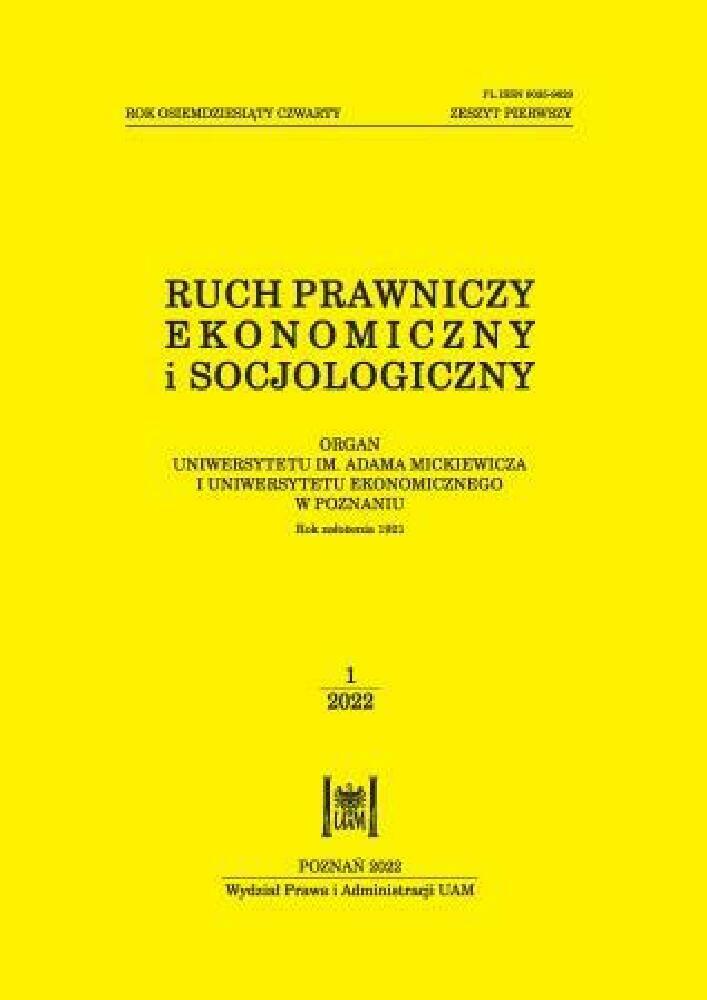Abstrakt
Celem artykułu jest prześledzenie współczesnych praktyk teoretycznych, które służą ponownemu zawiązaniu „kontraktu z roślinami”, oraz wskazanie tych wątków w obrębie intensywnie rozwijających się w dwóch ostatnich dekadach krytycznych studiów nad roślinami, których genealogii należy szukać w paradygmacie studiów feministycznych. W tym podejściu namysłowi krytycznemu ujawniającemu semiotyczne i materialne formy opresji w stosunku do roślin towarzyszą próby wypracowania praktyk reparacyjnych. Autorka śledzi historyczne formy deprecjonowania istot roślinnych, zarówno w polu teorii i filozofii, jak i w praktykach politycznych, społecznych i ekonomicznych. Kluczowe dla jej rozstrzygnięć są: zdefiniowanie specyficznej „podmiotowości” roślinnej, uznanie materialnej sprawczości roślin, włączenie do rozważań biopolitycznych zasady wegetalnej, a także rozważenie intersekcjonalnych uwikłań roślin w kontekście botaniki kolonialnej i polityki nasiennej. Autorka wskazuje, że w każdym z omawianych przypadków specyfika feministycznych studiów nad roślinami opiera się na rozpoznaniu ontologicznego i politycznego statusu rośliny, czego konsekwencją są uważność i troska, dbałość o widzialność i dobrostan konkretnych, materialnych i ucieleśnionych istot roślinnych będących dalekimi krewnymi gatunku ludzkiego.
Bibliografia
Agamben, G. (2008). Homo sacer. Suwerenna władza i nagie życie. Tłum. M. Salwa. Warszawa.
Alaimo, S. (2010). Bodily Natures: Science, Environment, and the Material self. Bloomington.
Baluška, F., Gagliano, M., Witzany, G. (2018). Memory and Learning in Plants. Berlin–Heidelberg.
Baluška, F., Ninkovič, V. (2010). Plant Communication from an Ecological Perspective. Berlin–Heidelberg.
Bird Rose, D. (2013). Val Plumwood’s philosophical animism: attentive interactions in the sentient world. Environmental Humanities 3: 93–109.
Brockway, L.H. (2002). Science and Colonial Expansion: The Role of British Royal Botanic Gardens. New York.
Chamovitz, D. (2014). Zmysłowe życie roślin. Co wiedzą rośliny. Tłum. D. Wójtowicz. Warszawa.
Crosby, A.W. (1999). Imperializm ekologiczny: Biologiczna ekspansja Europy 900–1900. Tłum. M. Kowalczuk. Warszawa.
Delaporte, F. (1982). Nature’s Second Kingdom: Explorations of Vegetability in Eighteenth Century. Cambridge, MA.
Doyle, R. (2011). Darwin’s Pharmacy: Sex, Plants, and the Evolution of the Noosphere. Washington.
Fara, P. (2003). Sex, Botany & Empire: The Story of Carl Linnaeus and Joseph Banks. London.
Gibson, P., Sandilands, C. (2021). Introduction: plant performance. Performance Philosophy 6(2): 1–23.
Gibson, P. (2018). The Plant Contract: Art’s Return to Vegetal Life. Boston.
Gibson, S. (2015). Animal, Vegetable, Mineral? How Eighteenth-Century Science Disrupted the Natural Order. Oxford.
Hall, M. (2011). Plants as Persons: A Philosophical Botany. Albany–New York.
Hamilton, J.M., Neimanis, A. (2018). Composting feminisms and environmental humanities. Environmental Humanities 10: 501–27.
Haraway, D. (2012). Manifest gatunków stowarzyszonych, [w:] A. Gajewska (red.), Teorie wywrotowe. Antologia przekładów. Poznań: 241–260.
Haraway, D., Ishikawa, N., Gilbert, S.F., Olwig, K., Tsing, A.L., Bubandt, N. (2016). Anthropologists are talking – about the Anthropocene. Ethnos 81(3): 535–564.
Harvey, G. (2006). Animism: Respecting the Living World. New York.
Kallhoff, A. (2014) Plants in Ethics: Why Flourishing Deserves Moral Respect. Environmental Values 23: 685–700.
Kimmerer, R.W. (2013). Braiding Sweetgrass: Indigenous Wisdom, Scientific Knowledge and the Teachings of Plants. Minneapolis.
Kimmerer, R.W. (2020). Pieśń Ziemi. Rdzenna mądrość, wiedza naukowa i lekcje płynące z natury. Tłum. M. Bukowska. Kraków.
Kimmerer, R.W. (2003). Gathering Moss: A Natural and Cultural History of Mosses. Corvallis.
Karafyllis, N. (2018). ‘Hey plants. Take a walk on the wild side!’: The ethics of seeds and seed banks, [w:] A. Kallhoff, M. Di Paola, M. Schörgenhumer (eds.), Plant Ethics: Concepts and Applications. Abingdon–New York: 188–203.
Kohn, E. (2013). How Forests Think: Toward an Anthropology Beyond the Human. Berkeley.
Mancuso, S., Viola, A. (2013). Błyskotliwa zieleń. Wrażliwość i inteligencja roślin. Wrocław.
Marder, M. (2013a). Plant-thinking: A Philosophy of Vegetal Life. New York.
Marder, M. (2013b). What is plant-thinking? Klesis. Revue philosophique 25: 124–143.
Mathews, F. (2008). Vale Val: In Memory of Val Plumwood. Environmental Values 17.
Miller, E.P. (2002). The Vegetative Soul: From Philosophy of Nature to Subjectivity in the Feminine. Albany–New York.
Mintz, S.W. (1986). Sweetness and Power: The Place of Sugar in Modern History. New York.
Morton, A.G. (1981). History of Botanical Science: An Account of the Development of Botany from Ancient Times to the Present Day. London.
Nealon J.T. (2016). Plant Theory: Biopower and Vegetable Life. Stanford, CA.
Pollan, M. (2002). The Botany of Desire: A Plant’s-eye View of the World. New York.
Pouteau, S. (2018) Plants as open beings: from aesthetics to plant-human ethics, [w:] A. Kallhoff, M. Di Paola, M. Schörgenhumer (eds.), Plant Ethics: Concepts and Applications. Abingdon–New York: 82–97.
Rogowska-Stangret, M. (2019). Think we must! (Otherwise). Philosophy Today 63(4): 823–844.
Rogowska-Stangret, M. (2021). Być ze świata. Cztery eseje o etyce posthumanistycznej. Gdańsk.
Schiebinger, L. (2004). Plants and Empire: Colonial Bioprospecting in the Atlantic World. Cambridge.
Schiebinger, L., Swan, C. (eds.) (2005). Colonial Botany: Science, Commerce and Politics in the Early Modern World. Philadelphia.
Serres, M. (1995). The Natural Contract. Tłum. E. MacArthur, W. Paulson. Michigan.
Shiva, V. (1997). Biopiracy: The Plunder of Nature and Knowledge. Boston.
Shteir, A. (1996). Cultivating Women, Cultivating Science: Flora’s Daughters and Botany in England, 1760–1860. London.
Trewavas, A.J. (2015). Plant Behaviour and Intelligence. Oxford.
Wandersee, J.H., Schussler, E.E. (2001). Toward a theory of plant blindness. Plant Science Bulletin 47(1): 2–9.
Whittle, T. (1976). Łowcy roślin. Tłum. L. Hausbrandtowa. Warszawa.
Wieland, T. (2009). Autarky and Lebensraum: the political agenda of academic plant breeding in Nazi Germany. Journal of History of Science and Technology 3: 14–34.
Williams, M. (2020). Perspective. Plant awareness disparity: a case for renaming plant blindness. <https://plantae.org/perspective-plant-awareness-disparity-a-case-for-renaming-plant-blindness-plants-people-planet/> [dostęp: 14.02.2022].
Zamorska, M. (2020). Etyka roślin. Wiedza, troska i stawanie się z Innymi. Prace Kulturoznawcze 24: 43–62.
Licencja
Prawa autorskie (c) 2022 WPiA UAM

Utwór dostępny jest na licencji Creative Commons Uznanie autorstwa – Użycie niekomercyjne – Bez utworów zależnych 4.0 Międzynarodowe.





